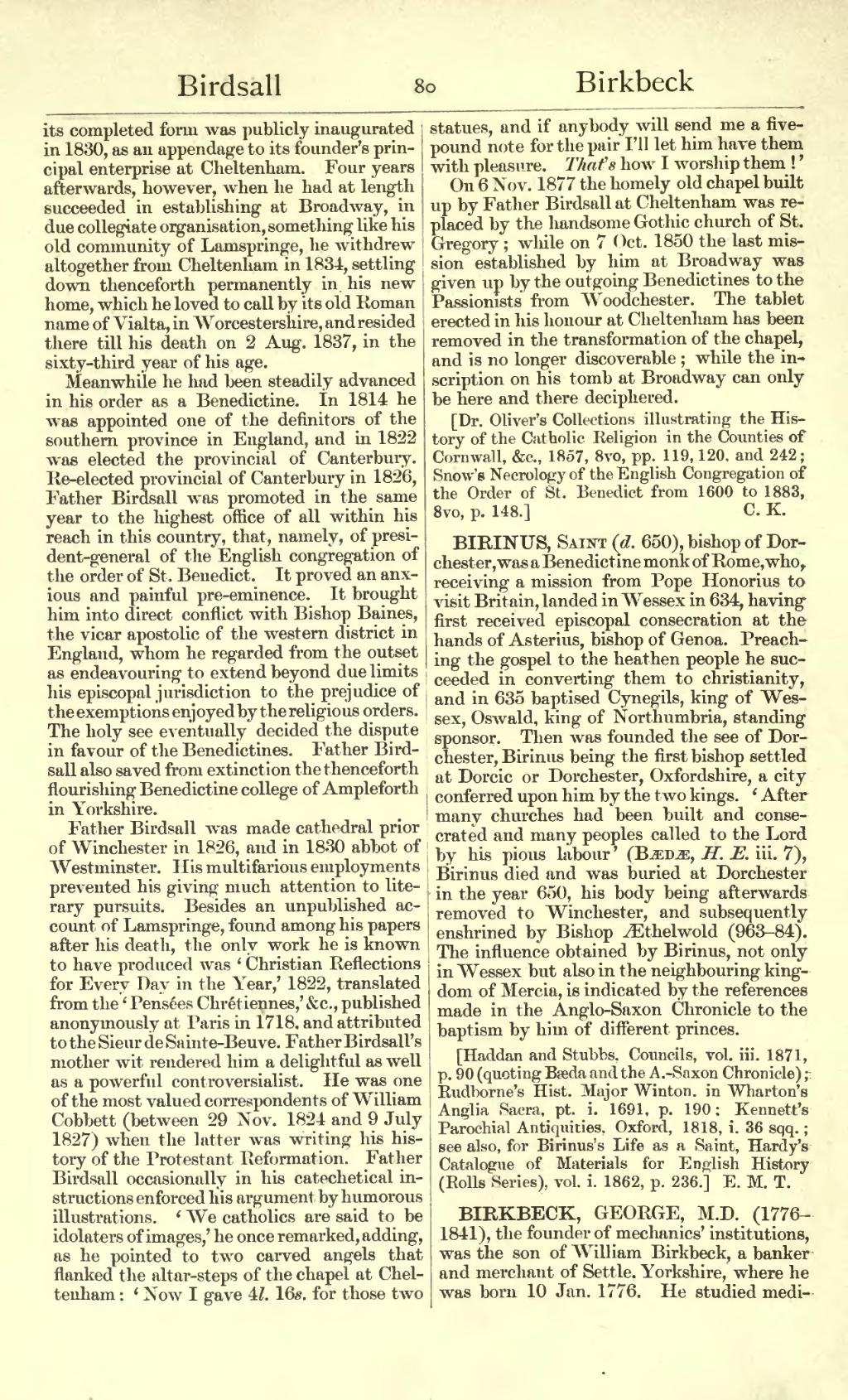its completed form was publicly inaugurated in 1830, as an appendage to its founder's principal enterprise at Cheltenham. Four years afterwards, however, when he had at length succeeded in establishing at Broadway, in due collegiate organisation, something like his old community of Lamspringe, he withdrew altogether from Cheltenham in 1834, settling down thenceforth permanently in his new home, which he loved to call by its old Roman name of Vialta, in Worcestershire, and resided there till his death on 2 Aug. 1837, in the sixty-third year of his age.
Meanwhile he had been steadily advanced in his order as a Benedictine. In 1814 he was appointed one of the definitors of the southem province in England, and in 1822 was elected the provincial of Canterbury. Re-elected provincial of Canterbury in 1826, Father Birdsall was promoted in the same year to the highest office of all within his reach in this country, that, namely, of president-general of the English congregation of the order of St. Benedict. It proved an anxious and painful pre-eminence. It brought him into direct conflict with Bishop Baines, the vicar apostolic of the western district in England, Whom he regarded from the outset as endeavouring to extend beyond due limits his episcopal jurisdiction to the prejudice of the exemptions enjoyed by the religious orders. The holy see eventually decided the dispute in favour of the Benedictines. Father Birdsall also saved from extinction the thenceforth flourishing Benedictine college of Ampleforth in Yorkshire.
Father Birdsall was made cathedral prior of Winchester in 1826, and in 1830 abbot of Westminster. His multifarious employments prevented his giving much attention to literary pursuits. Besides an unpublished account of Lamspringe, found among his papers after his death, the only work he is known to have produced was 'Christian Reflections for Every Day in the Year,' 1822, translated from the 'Pensées Chrétiennes,' &c., published anonymously at Paris in 1718. and attributed to the Sieur de Sainte-Beuve. Father Birdsall's mother wit rendered him a delightful as well as a powerful controversialist. He was one of the most valued correspondents of William Cobbett (between 29 Nov. 1824 and 9 July 1827) when the latter was writing his history of the Protestant Reformation. Father Birdsall occasionally in his catechetical instructions enforced his argument by humorous illustrations. 'We catholics are said to be idolaters of images,' he once remarked, adding, as he pointed to two carved angels that flanked the altar-steps of the chapel at Cheltenham: 'Now I gave 4l. 16s. for those two statues, and if anybody will send me a five-pound note for the pair I'll let him have them with pleasure. That's how I worship them!'
On 6 Nov. 1877 the homely old chapel built by Father Birdsall at Cheltenham was replaced by the handsome Gothic church of St. Gregory; while on 7 Oct. 1850 the last mission established by him at Broadway was given up by the outgoing Benedictines to the Passionists from Woodchester. The tablet erected in his honour at Cheltenham has been removed in the transformation of the chapel, and is no longer discoverable; while the inscription on his tomb at Broadway can only be here and there deciphered.
[Dr. Oliver's Collections illustrating the History of the Catholic Religion in the Counties of Cornwall, &c., 1857, 8vo, pp. 119, 120. and 242; Snow's Necrology of the English Congregation of the Order of St. Benedict from 1600 to 1883, 8vo p. 148.]
BIRINUS, Saint (d. 650), bishop of Dorchester, was a Benedictine monk of Rome, who, receiving a mission from Pope Honorius to visit Britain, landed in Wessex in 634, having first received episcopal consecration at the hands of Asterius, bishop of Genoa. Preaching the gospel to the heathen people he succeeded in converting them to christianity, and in 635 baptised Cynegils, king of Wessex, Oswald, king of Northumbria, standing sponsor. Then was founded the see of Dorchester, Birinus being the first bishop settled at Dorcic or Dorchester, Oxfordshire, a city conferred upon him by the two kings. After many churches had been built and consecrated and many peoples called to the Lord by his pious labour (Bædæ, H. E. iii. 7), Birinus died and was buried at Dorchester in the year 650, his hody being afterwards removed to Winchester, and subsequently enshrined by Bishop Æthelwold (963-84). The influence obtained by Birinus, not only in Wessex but also in the neighbouring kingdom of Mercia, is indicated by the references made in the Anglo-Saxon Chronicle to the baptism by him of different princes.
[Haddon and Stubbs. Councils, vol. iii. 1871, p. 90 (quoting Breda and the A.-Saxon Chronicle); Rudborne's Hist. Major Winton. in Wharton's Anglia Sacra, pt. i. 1691. p. 190: Kennett's Parochial Antiquities, Oxford, 1818, i. sqq., see also, for Birinus's Life as a Saint, Hardy’s Catalogue of Materials for English History (Rolls Series), vol. i. 1862, p. 236.]
BIRKBECK, GEORGE, M.D. (1776–1841), the founder of mechanics' institutions, was the son of William Birkbeck, a banker and merchant of Settle, Yorkshire, where he was born 10 Jan. 1776. He studied medi-
